English : Term 3 Unit 2 : Prose : A Story of Self Sacrifice and Bravery
Warm Up
Many people become engineers, doctors, IAS officers, film stars and so on. But few become “Human”.
Look at the pictures.

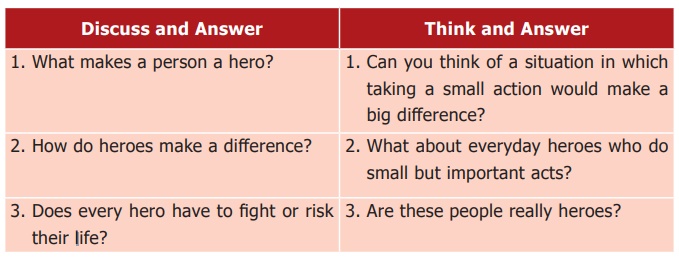
Discuss and answer.
1. What makes a person a hero?
A person becomes a hero, if he risks his / her life for the sake of others.
2. How do heroes make a difference?
A hero is a person of distinguished courage and ability. They are admired for their brave deeds and noble qualities.
3. Does every hero have to fight or risk their life?
No, not every hero has to fight or risk his life. If he values humanity and does his best, he is a hero.
Think and Answer.
1. Can you think of a situation in which taking a small action would make a big difference?
One day, I joined a mission-oriented online group. I raised money for a good cause. I started my own website. I volunteered for it remotely. I donated for a good cause. A small action of mine, made a big difference in my life.
2. What about everyday heroes, who do small but important acts?
Everyday heroes should be appreciated for their valuable acts of brave deeds. They are not admired because their acts are unknown to the public.
3. Are these people really heroes?
Yes, these people are really heroes.
Section I
Discuss and Answer.
1. How did Neerja save the Americans?
Answer: Neerja saved the Americans by hiding their passports and throwing them down the rubbish bins.
2. Why did Neerja alert the pilots?
Answer: Neerja alerted the pilots to escape through the alternate exits.
3. What happened when the terrorists lost their patience?
Answer: When the terrorists lost their patience, Neerja leapt into action. She shed all her hesitation and fears. She worked her way around helping to save as many passengers as she could.
GLOSSARY
Hijacked – illegally seized shoppingmode control of an aircraft, ship, etc
Calamity – a sudden event causing great damage or distressass
Aulted – attacked violently
Frustration – the feeling of annoyance when one’s actions are prevented from progressing or succeeding
infl icted – caused something unpleasant to be suffered by
Section II
Discuss and Answer
1. Name the schools and colleges Neerja studied in.
Answer: Neerja studied in Sacred Heart School and Bombay Scottish School. She got graduated from St. Xavier’s College.
2. Why was Neerja sent to London?
Answer: Neerja was sent to London to train to be a Purser.
3. What is the duty of a purser?
Answer: Pursers worked as managers on flights. They handled passenger, complaints and security. They also made required announcements.
GLOSSARY
Disaster –a sudden misfortune, catastrophe
Pressurizing – persuading or forcing someone into doing something
Performance –doing something to a specifi ed standard
Achievement – attainment, success
Section III
Discuss and Answer.
1. Why was Neerja awarded the Ashok Chakra?
Answer: Neerja was awarded the Ashok Chakra for bravery in peacetime.
2. How was Neerja honoured by various governments?
Answer: Neerja act of bravery was acknowledged and rewarded by the Indian, Pakistan and American governments. She was awarded the Ashoka Chakra. A postage stamp was also issued in her honour in 2004. She received ‘Justice for Crimes Award’ and ‘Tamgha-e-Insaniyat Award’.
3. What are the selection criteria for the Neerja Bhanot Pan Am Award?
Answer: The trust presents two awards every year – one to honour a flight crew member. The other to an Indian Woman who overcomes social injustice.
GLOSSARY
civilian – a person not in the armed services or police force
posthumously – after the death of the person
crew – a group of people who work on a ship, aircraft or train
injustice – lack of justice, unfairness
Think and Answer
1. According to Neerja’s father, Neerja had well defi ned principles and there was little room for compromise in that area. Do you have any principles where you don’t want to compromise?
Answer: I have certain principles in my life. I am always committed to my duty. I do exactly what makes me love myself. I always move myself in the right direction. I will never compromise with anyone in these areas.
2. Virinda told the Indian Express that Neerja was a loyal friend. Are you always loyal to your friend?
Answer: Yes, I am always loyal to my best friends Latha and Revathi.
3. Neerja would speak her mind, tell them the truth, according to one of her classmate Eliza. Do you always have the courage to stand for truth?
Answer: Yes, I do have the courage to stand for truth. But on some occasions, I had to keep quiet for the benefit of my dear ones.
Questions Answers
READ AND UNDERSTAND
A. Fill in the blanks.
1. The terrorists asked Neerja to collect the passports of the passengers because they could identify the Americans on board.
2. Neerja passed on the warning in a code to the pilots because he wanted to alert them.
3. Neerja leapt into action when she noticed there was chaos on board.
4. Neerja had a sour marriage due to pressurizing dowry demands.
5. Neerja was sent to London based on her performance and peer review.
B. Think and Write
1. “I will die; but not run away.” – Justify the saying of Neerja.
Answer: The family of Neerja were discussing about the sensitive situation of an imaginary hijack. Then Neerja said these words, ’I will die, but not run away’. She was determined not to be a coward. She lived up to her word.
2. Why did the three governments of – India, America and Pakistan – honour Neerja?
Answer: India, America and Pakistan acknowledged her act of bravery. She had saved so many passengers, risking her life. So she was honoured by these governments.
3. How can we abolish terrorism?
Answer: We can abolish terrorism by the following ways :
(a) Stop supporting the Dictators who found terrorism.
(b) Stop Arming terrorists.
(c) Stop Imperial Conquests for Arab oil.
(d) Stop torture.
(e) Tackle corruption and money laundering.
C. Read the “Story of Self Sacrifice and Bravery” once again and complete the flow chart.
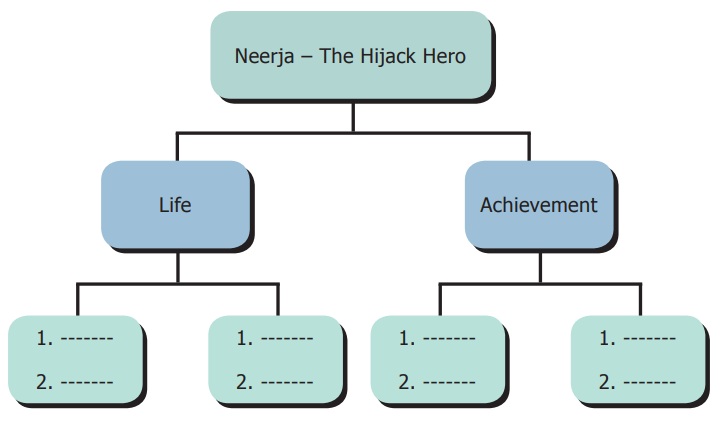
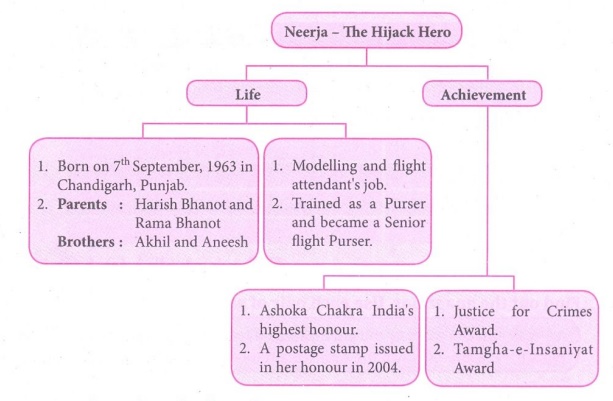
D. Write a summary based on the flow chart.
Answer: Neerja Bhanot was born on 7th September, 1963 in Chandigarh, Punjab, India. Her parents were Harish Bhanot and Rama Bhanot. Her father was a Mumbai based journalist. She had two brothers named Akhil and Aneesh. She started her career in modelling. She then applied for a flight attendant’s job with ‘Pan Am’. She sent to London to be trained as a Purser. Soon she became a senior flight purser. She was awarded the Ashoka Chakra award from the Indian government. A postage stamp was also issued in her honour in 2004. She was also awarded the Justice for Crimes was also issued the Tamgha-e-Insaniyat Award from American and Pakistan government.
Vocabulary
Airline Vocabulary
E. Fill in the blanks with appropriate airline vocabulary given in the box.
cockpit | touch down | call light | gate | turbulence | bumpy | take off | landing | boarding pass | run way
1. You must present the boarding pass at the gate.
2. It might be a bumby ride because we are flying through a storm.
3. If you need anything just press the call light.
4. The captain and the co-pilot sit in the cockpit.
5. Gate 3B is down this hall and to your right.
6. We will be landing in Chennai in approximately ten minutes.
7. The plane almost missed the run away because it was such a bad storm.
8. We are next in line to take off on this run way.
9. That was a very smooth touch down.
10. This turbulence should only last a few minutes.
Phrasal Verb
F. Match the phrasal verbs in column A with their meaning in Column B.
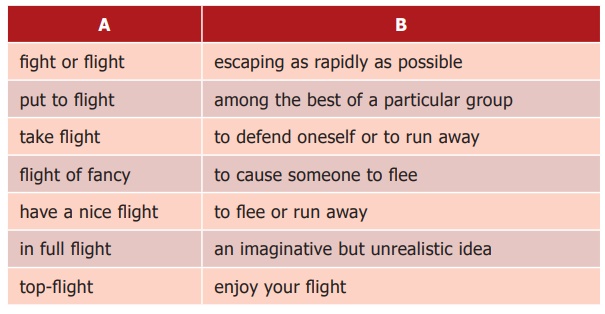
[ Answer: 1. (c); 2. (d); 3. (e); 4. (f); 5. (g); 6. (a); 7. (b)]
1. fight or flight (c) to defend oneself or to run away
2. put to flight (d) to cause someone to flee
3. take flight (e) to flee or run away
4. flight of fancy (f) an imaginative but unrealistic idea
5. have a nice flight (g) enjoy your flight
6. in full flight (a) escaping as rapidly as possible
7. top-flight (b) among the best of a particular group
G. Find out the anagrams. Use each pair of phrases as clues.
An anagram is a word or phrase formed by rearranging the letters of a different word or phrase, typically using all the original letters exactly once. Eg. Seat – east, alert – alter
1. The past tense of leap leapt
Something to serve food on plate
2. A place to grow flowers garden
Something to be careful of danger
3. Another word for under below
A part of your arm elbow
4. Try to hear listen
Another word for quiet silent
5. Another word for gift present
A large snake or a dragon serpent
6. Minutes and hours time
A thing on a list item
7. An organ that pumps blood heart
The planet we live on earth
8. Something used to water plants hose
A thing you put on your foot shoe
Listening
H. Listen to the announcements and answer the questions.
Final Boarding Announcement
This is the fi nal boarding call for passengers Alex and Ruskin Collins booked on fl ight 372A to New Delhi. Please proceed to gate 3 immediately. The fi nal checks are being completed and the captain will order for the doors of the aircraft to close in approximately fi ve minutes. I repeat. This is the fi nal boarding call for Alex and Ruskin. Thank you.
Announcement 1
1. What is the number of the flight?
Answer: The number of the light is 89 B.
2. What are the things to be kept ready?
Answer: Boarding Pass and Identification are the things to be kept ready.
3. When will the regular boarding begin?
Answer: The regular boarding will begin in approximately ten minutes.
Announcement 2
1. For whom is the final boarding call?
Answer: The final boarding call is for passengers Alex and Ruskin Collins.
2. Where should the passengers proceed?
Answer: The passengers should proceed to gate 3 immediately.
3. Where is the flight to?
Answer: The flight is to New Delhi.
Announcement 3
1. When will the flight be in the air?
Answer: The flight is expected to be in the air in approximately seven minutes.
2. What are things that should be turned off?
Answer: All personal electronic devices including laptops and cell phones should be turned off.
3. What is prohibited during the flight?
Answer: Smoking is prohibited during the flight.
Speaking
I. Read the story board and take roles as pilot and flight attendants to enact the scene.
Inflight Passenger Announcements
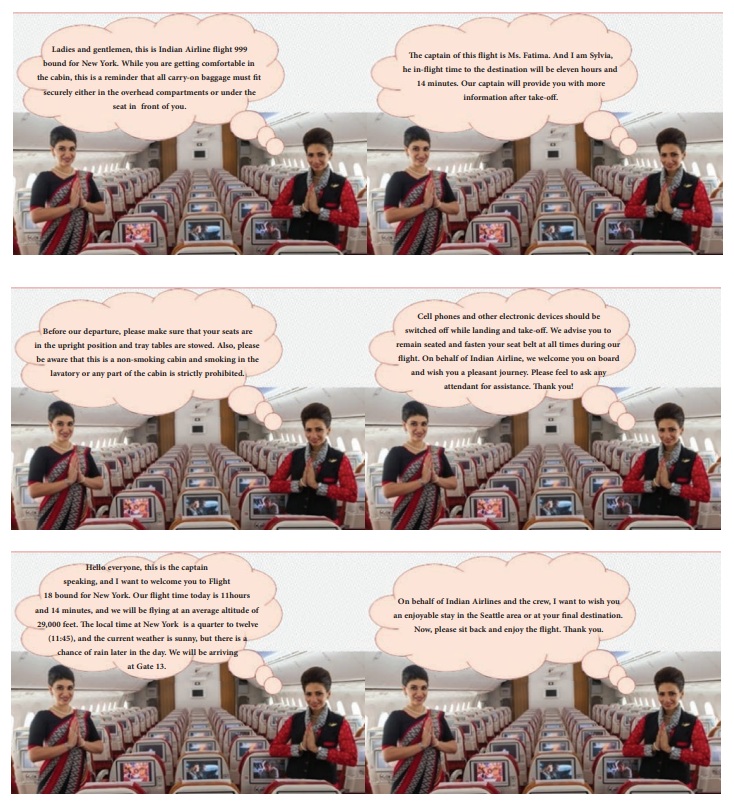
Answer:
Flight Attendant 1 : Ladies and Gentlemen, this is Indian Airline flight 999 bound for New York. This is a reminder that all carry-on baggage must fit securely either in the overhead compartments or under the seat in front of you.
Flight Attendant 2 : The captain of this flight is Ms. Fatima. And I am Sylvia, the in-flight time to the destination will be eleven hours and 14 minutes. Our captain will provide you with more information after take-off.
Flight Attendant 1 : Before our departure, please make sure that your seats are in the upright position and tray tables are stowed. Also, please be aware that this is a non-smoking cabin and smoking in the lavatory or any part of the cabin is strictly prohibited.
Flight Attendant 2 : Cell phones and other electronic devices should be switched off while landing and take-off. We advise you to remain seated and fasten your seat belt at all times during our flight. On behalf of Indian Airline, we welcome you on board and wish you a pleasant journey. Please feel free to ask any attendant for assistance. Thank you!
Pilot : Hello everyone, this is the captain speaking, and I want to welcome you to Flight 18 bound for New York. Our flight time today is 11 hours and 14 minutes, and we will be flying at an average altitude of 29,000 feet. The local time at New York is a quarter to twelve (11:45), and the current weather is sunny, but there is a chance of rain later in the day. We will be arriving at Gate 13.
Flight Attendant 1 : On behalf of Indian Airlines and the crew, I want to wish you an enjoyable stay in the Seattle area or at your final destination. Now, please sit back and enjoy the flight. Thank you.
J. Imagine that you are going to interview one of the survivors of the Pan Am Hijack. Discuss with your partner and write down the conversation. Then one of you play the role of the interviewer and other the survivor. You can use the sample questions given below.
1. Do you have any information regarding the suspects of the hijack?
2. Which countries did the hijackers belong?
3. What are the details of the hijacked flight?
4. How many passengers were aboard?
5. What happened in the last few minutes of the hijack drama?
6. Do you have information regarding the victims?
7. Was there any recorded communication to/from the plane during the hijacking?
8. How many terrorists were there?
9. How did you feel when you were in the flight?
10. Can you recall Neerja’s role in safeguarding the passengers?
Answer:
Interviewer : Good Morning Sir. This is Manoj Tiwari from the ‘Hindu’. I would like to interview you, as you are one of the survivors of the ‘Pan Am Hijack’.
Survivor : Yes, it’s true. I should thank the Almighty God and Neerja for saving our lives.
Interviewer : Yes, she had done a brave act, risking her life. Do you have any information regarding the suspects of the hijack?
Survivor: No, I don’t have any information about them. But they do belong to Palestinian Organisation backed by Libya.
Interviewer : How many passengers were on board?
Survivor : There were around 360 passengers and 13 crew members.
Interviewer : How many terrorists were there?
Survivor : There were four Armed Terrorists.
Interviewer : Was there any recorded communication to / from the plane during the hijacking?
Survivor : I don’t remember anything like that happened.
Interviewer : How did you feel when you were in the flight?
Survivor : We were all holding our breaths and terrified.
Interviewer : Can you recall Neerja’s role in safeguarding the passengers?
Survivor : She shed all her hesitations and fears and worked her way around evacuating as many passengers as she could. She waited selflessly in the face of death to help the ones around her. Such a great soul she is!
K. Read the story board and take roles as pilot and flight attendants to enact the scene.
Answer:
Interviewer : Good Morning Sir. This is Manoj Tiwari from the ‘Hindu’. I would like to interview you, as you are one of the survivors of the ‘Pan Am Hijack’.
Survivor : Yes, it’s true. I should thank the Almighty God and Neerja for saving our lives.
Interviewer : Yes, she had done a brave act, risking her life. Do you have any information regarding the suspects of the hijack?
Survivor: No, I don’t have any information about them. But they do belong to Palestinian Organisation backed by Libya.
Interviewer : How many passengers were on board?
Survivor : There were around 360 passengers and 13 crew members.
Interviewer : How many terrorists were there?
Survivor : There were four Armed Terrorists.
Interviewer : Was there any recorded communication to / from the plane during the hijacking?
Survivor : I don’t remember anything like that happened.
Interviewer : How did you feel when you were in the flight?
Survivor : We were all holding our breaths and terrified.
Interviewer : Can you recall Neerja’s role in safeguarding the passengers?
Survivor : She shed all her hesitations and fears and worked her way around evacuating as many passengers as she could. She waited selflessly in the face of death to help the ones around her. Such a great soul she is!
Grammar
PICTO GRAMMAR
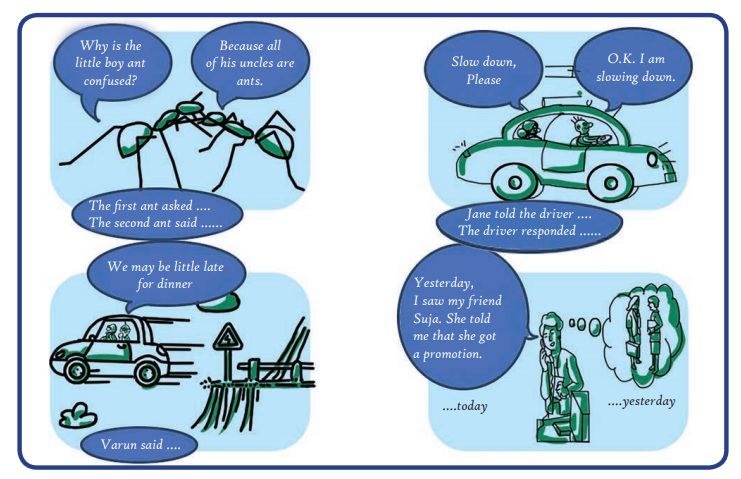
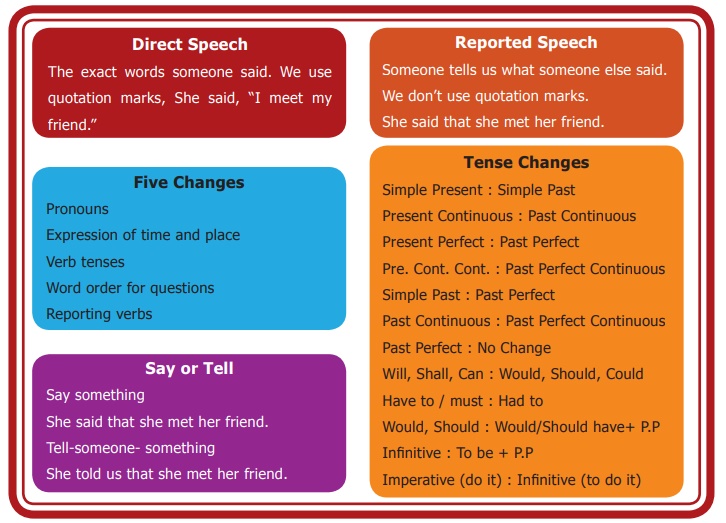
Direct Speech : The exact words someone said.
Example : She said, “I meet my friend.”
(We use quotation marks.)
Reported Speech : Someone tells us what someone else said.
Example : She said that she met her friend.
( We don’t use quotation marks.)
Five changes :
Pronouns
Verb tenses
Reporting verbs
Expression of time and place
word order for questions
Tense Changes
Tense To change
Simple Present → Simple Past
Present Continuous → Past Continuous
Present Perfect → Past Perfect
Pre. Cont. Cont. → Past Perfect Continuous
Simple Past → Past Perfect
Past Continuous → Past Perfect Continuous
Past Perfect → No Change
Will, Shall, Can→ Would, Should, Could
Have to / must→ Had to
Would, Should → Would/ Should have+ P.P
Infinitive → To be + P.P
Imperative (do it) → Infinitive (to do it)
USE GRAMMAR
L. Discuss with your partner and punctuate the following.
1. the woman said to the student please help me cross the street
Answer: The woman said to the students, “Please help me cross the street.”
2. sarathy said oh how thrilling it was
Answer: Sarathy said, “Oh, how thrilling it was!”
3. the teacher said to the students where do you want to go
Answer: The teacher said to the students, “Where do you want to go?”
4. i am tired mohana said to her aunt
Answer: “I am tired,” Mohana said to her aunt.
5. shankar said to his teacher madam i had prepared my project assignment but i forgot to bring it
Answer: Shankar said to his teacher, “Madam, I had prepared my project assignment. but I forgot to bring it.”
M. Complete the sentences in reported speech.
Example: I admire you. She said that she admired me.
1. “It is too late.” I said that it was too late.
2. “I met you yesterday.” Sam told me that he had met me the previous day
3. “I cannot come.” Mala said that she couldn’t come
4. “I will pay tomorrow.” He said that he would pay the next day
5. “The Himalayas are the highest mountain ranges.” He knew that the Himalayas are the highest mountain ranges.
6. “I may lend you some money.” Balu promised to lend him some money.
7. “I have been watching a film.” He said that he had been watching a film.
8. “I have not done it today.” I explained that I had not done it that day
9. “I was with him last week.” Jimmy told that he was with him the previous week.
10. “I will finish this picture tomorrow.” Jothi said that he would finish that picture the next day.
N. Read the following dialogue and report it.
Betty: What are you doing here, Kitty? I haven’t seen you since June.
Kitty: I’ve just come back from my holiday in Darjeeling.
Betty: Did you enjoy it?
Kitty: I love Darjeeling. The landscape is amazing.
Betty: Did you go to the Lloyd’s Botanical Garden?
Kitty: Yes. It was my first trip. I can show you some pictures. Are you doing any thing tomorrow?
Betty: I must arrange a couple of things. But I am free tonight.
Kitty: You might come to my place. What time shall we meet?
Betty: I’ll be there at eight. Is it all right?
Answer:
Betty asked Kitty And she added that she hadn’t seen her since June. Kitty explained that she had just come back from her holiday in Darjeeling. Betty asked if she had enjoyed it. Kitty told her that she loved Darjeeling and that the landscape was amazing. Betty wanted to know if she had gone to the Lloyd’s Botanical Garden. Kitty said that it had been her first trip and that she could show her some pictures. And then she asked her if she was doing anything the next day. Betty explained that she had to arrange a couple of things. But she added that she was free that night. Kitty suggested that she might come to her place and asked her at what time they should meet. Betty said she would be there at eight. And finally, she asked whether it was all right.
Language Check Point
Tell: My friend told me that he was making pizza.
Say : My friend said to me that he was making pizza.
Usage: When we use say, we use ‘to’ before the object – if there is an object.
If: I don’t know if Nancy wants tea or coffee.
Whether: I don’t know whether Nancy wants tea or coffee.
Usage: When you use whether – you are only offering two choices – the two things you say, tea or coffee. But when you use if there is another possibility. As well as the two choices, there is a third.
Command: The traffic police ordered to obey the traffic rules.
Order: The traffic police commanded to obey the traffic rules.
Usage: An order is a direction to do something with an implied threat attached to it. A command is a direction to do something with no threats attached.
Writing and Creative Writing
WRITING
O. Read the story of Neerja Bhanot. Make notes based on the table and complete it.
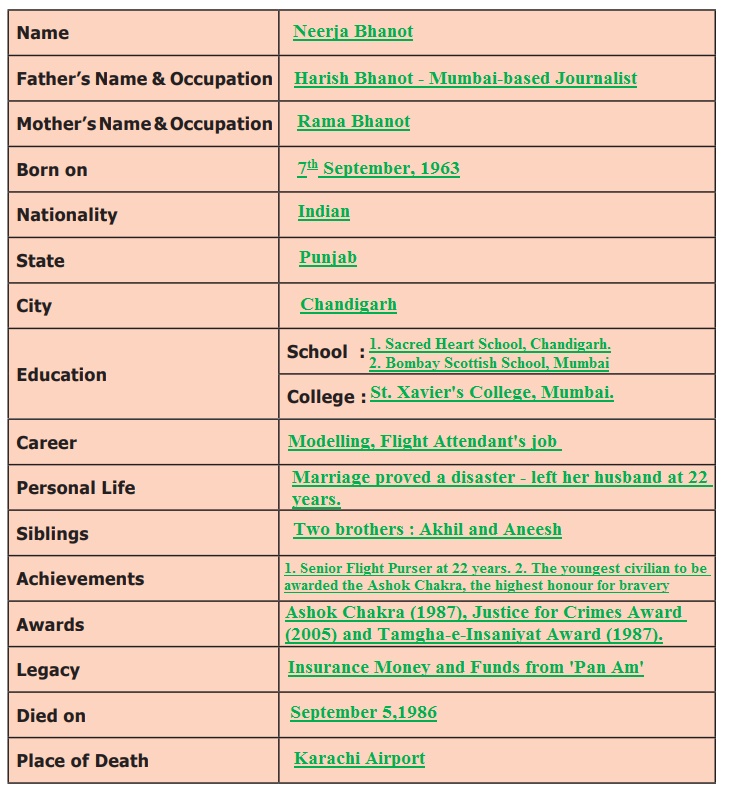
Answer:
Name : Neerja Bhanot
Father’s Name & Occupation : Harish Bhanot – Mumbai-based Journalist
Mother’s Name & Occupation : Rama Bhanot
Born on : 7th September, 1963
Nationality: Indian
State : Punjab
City : Chandigarh
Education
School : 1. Sacred Heart School, Chandigarh. 2. Bombay Scottish School, Mumbai
College : St. Xavier’s College, Mumbai.
Career : Modelling, Flight Attendant’s job
Personal Life : Marriage proved a disaster – left her husband at 22 years.
Siblings : Two brothers : Akhil and Aneesh
Achievements 1. Senior Flight Purser at 22 years. 2. The youngest civilian to be awarded the Ashok Chakra, the highest honour for bravery
Awards : Ashok Chakra (1987), Justice for Crimes Award (2005) and Tamgha-e-Insaniyat Award (1987).
Legacy : Insurance Money and Funds from ‘Pan Am’
Died on : September 5,1986
Place of Death : Karachi Airport
CREATIVE WRITING
P. “Heroes are ordinary people who do extraordinary things.” Write an anecdote on the extraordinary deed of Jaiswal K.P. who helped in the recent Kerala Flood. Use the tips given in the box.
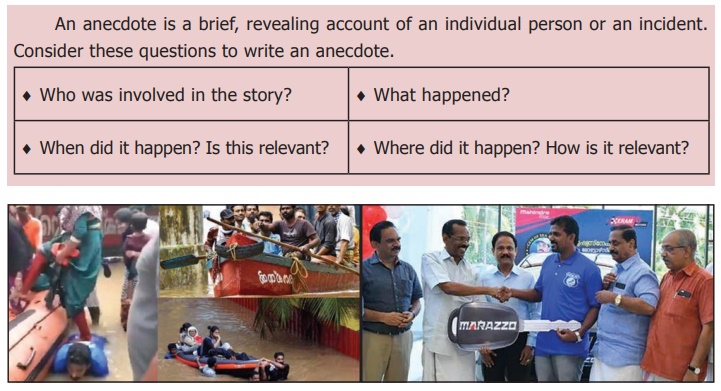
Who was involved in the story?
Answer: Jaiswal. K.P. was involved in the story.
What, when, where happened?
Answer: In the year 2018 August there was severe flood in Kerala due to high rainfall. 483 people died. 140 people were said to be missing. Due to flood, there were landslides 1,50,000 people were evacuated. Several districts were isolated. Traffic became impossible. Coastel areas were submerged.
How is it relevant?
Answer: J.P. Kaiswal is a resident of Tanur. He helped an elderly woman step into an, inflatable boat. The fishermen and local residents helped the victims of flood to a great extent.














